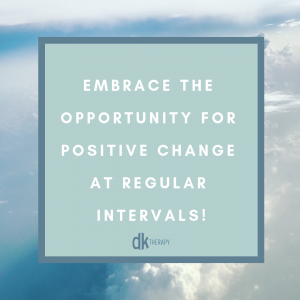3 Tips to Keep Your Commitments To Positive Changes
All the same, annual milestones for positive change can be productive and healthy things to build from every year and can be chosen individually to best fit our individual motivations for positive and sustainable self-improvement.
As I begin this process in my case with Lent, my self-talk wavers between minimizing the difficulty of giving up a bottle of wine, as it’s not a significant immediate loss, and recognizing the social significance I’ll have to adjust to in the upcoming months possibly not partaking in alcoholic social occasions as much. It’s an opportunity to dedicate the saved money as such to charity and to explore a different way of connecting to the loved ones I share that wine with. My drinking companions are of course not obligated or expected to abstain from drinking, and I look forward to exploring what changes will be promoted in our relationship. I also thought about when I would have time to pray, I struggled to think about when I would get some quiet moments. Praying daily, something I have found to have a great positive benefit for me in the past, just as daily meditation or self-reflection might for a secular person, was not something that I had done in earnest since the diagnosis of leukemia in one of my children. Would my practice of prayer get put to the back-burner when life gets too busy? What would I even pray about? Having read that it’s at times best to have a prayer focus, I decided my focus would be on thankfulness and others who need support. I’d like the opportunity to give back and provide the dozens of prayer groups and countless individuals with the same type of support they gave me and my family during our trying time. The same could perhaps be said for self-reflection and meditation versions of this for a person that is secular. The psychological aspects of Lent are not to be overlooked, as each individual participating is embarking on a period of change. Many of us will quickly and completely quit drinking, smoking, or eating meat only to embarrassingly find ourselves lighting up that cigarette out of sheer habit the moment we wake up. Similar struggles to say a person, not of faith with New Year’s Resolutions. Let’s not forget the emotional longing – not eating meat on Ash Wednesday has reminded me how much I like bacon! Simple strategies will help to reinforce good intentions.
- Make your intentions known and have a pleasant substitute for the item of abstinence. My sister knows I’m not drinking with her and she’s prepared to hold me accountable while she indulges. I’ll be sipping sparkling water as a replacement. A secular person with similar or different goals could find an accountability partner as such as well.
- Use a calendar or online reminder to reinforce your goal. An Orthodox mother of 4 devised a brilliant calendar and freezer system to prepare for the additional challenges Lent brings for feeding her family. A person not of faith could do similar with resolutions for a new year or a month on a regular basis.
- Set aside the time necessary for the goal. My personal goal of praying daily will require nothing but my time. I’ve decided to use my commute time to pray with an app. My lunch break and thirty minutes before bed are other times in my day, I can accomplish this task. Similar strategies could easily work with secular self-reflection or meditation.
 Ultimately, Lent provides an opportunity to practice change as do many other secular annual milestones. Forty days of consistency from Lent can provide the boost needed to make greater strides in self-improvement, from our spiritual and secular positivity and fitness to our awareness of our social interactions and dynamics. You also do not need to be devotedly religious or religious at all to practice this change either. [/av_textblock] [/av_one_full]
Ultimately, Lent provides an opportunity to practice change as do many other secular annual milestones. Forty days of consistency from Lent can provide the boost needed to make greater strides in self-improvement, from our spiritual and secular positivity and fitness to our awareness of our social interactions and dynamics. You also do not need to be devotedly religious or religious at all to practice this change either. [/av_textblock] [/av_one_full]




